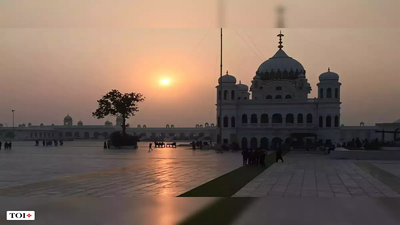Top Searches
- News
- City News
- chandigarh News
- In brief to Canadian parliamentary panel, Sikh bodies talk extradition law
In brief to Canadian parliamentary panel, Sikh bodies talk extradition law

Representative Image
JALANDHAR: The British Columbia Gurdwaras Council (BCGC) and Ontario Gurdwaras Committee (OGC) have jointly submitted a brief on extradition law reform to the Canadian House of Commons' standing committee on justice and human rights.
The brief highlights what the two gurdwara bodies call "the unfair procedures and lack of human rights protections under Canada's extradition framework".
The two Sikh bodies, who claim to represent over 30 Sikh institutions in Canada, have argued that the North American country's extradition process, at present, is a "highly discretionary and politicised process, which prioritizes administrative efficiency and the executive's authority in matters of foreign affairs over maintaining charter rights and Canada's international human rights obligations". "It is imperative that Canadian legislators proactively address these gaps to accord with the purpose of the charter and prevent violations," they have argued.
In the brief, they have also presented 'Case Study: Sikh activism and Indian responses around the world' to buttress their contention for a reform in the law. They have argued, "While using broad anti-terror legislation and extrajudicial violence domestically, Indian agencies have engaged in foreign interference and bad faith interactions with other states in order to secure custody of Sikh activists in the diaspora."
The brief has alleged that in recent years, there has been a marked uptick in the frequency of Indian officials and security agencies levelling allegations about Sikh extremism in Canada. It has also cited Canada's national security and intelligence advisor (NSIA) alleging that during Canadian PM's trip to India in 2018 that "factions within the Indian government" acted deliberately in order to embarrass the Canadian government and undermine the reputation of respected public institutions due to its purported support for Sikh activists in Canada.
The brief has also cited British national Jagtar Singh 'Jaggi' Johl's case.
They have also argued that there should be no risk that decisions on extradition may be influenced by electoral calculations, partisan concerns, foreign interference, short-term foreign policy interests or other extrinsic reasons without judicial oversight. "It is even more pressing given that Canada's recent Indo-Pacific Strategy identifies India as a critical partner in achieving its objectives and in response, Indian officials have made comments about "cracking down" on Sikh activism in Canada in a manner suggestive of quid pro quo," the Sikh bodies have argued.
The brief highlights what the two gurdwara bodies call "the unfair procedures and lack of human rights protections under Canada's extradition framework".
The two Sikh bodies, who claim to represent over 30 Sikh institutions in Canada, have argued that the North American country's extradition process, at present, is a "highly discretionary and politicised process, which prioritizes administrative efficiency and the executive's authority in matters of foreign affairs over maintaining charter rights and Canada's international human rights obligations". "It is imperative that Canadian legislators proactively address these gaps to accord with the purpose of the charter and prevent violations," they have argued.
In the brief, they have also presented 'Case Study: Sikh activism and Indian responses around the world' to buttress their contention for a reform in the law. They have argued, "While using broad anti-terror legislation and extrajudicial violence domestically, Indian agencies have engaged in foreign interference and bad faith interactions with other states in order to secure custody of Sikh activists in the diaspora."
The brief has alleged that in recent years, there has been a marked uptick in the frequency of Indian officials and security agencies levelling allegations about Sikh extremism in Canada. It has also cited Canada's national security and intelligence advisor (NSIA) alleging that during Canadian PM's trip to India in 2018 that "factions within the Indian government" acted deliberately in order to embarrass the Canadian government and undermine the reputation of respected public institutions due to its purported support for Sikh activists in Canada.
The brief has also cited British national Jagtar Singh 'Jaggi' Johl's case.
They have also argued that there should be no risk that decisions on extradition may be influenced by electoral calculations, partisan concerns, foreign interference, short-term foreign policy interests or other extrinsic reasons without judicial oversight. "It is even more pressing given that Canada's recent Indo-Pacific Strategy identifies India as a critical partner in achieving its objectives and in response, Indian officials have made comments about "cracking down" on Sikh activism in Canada in a manner suggestive of quid pro quo," the Sikh bodies have argued.
Start a Conversation
FOLLOW US ON SOCIAL MEDIA
FacebookTwitterInstagramKOO APPYOUTUBE









